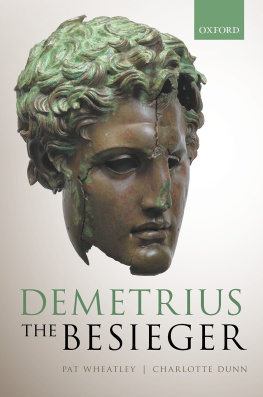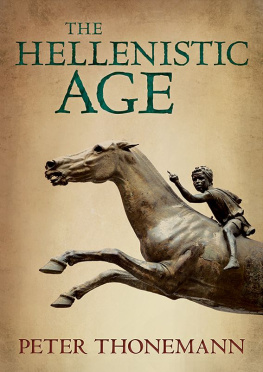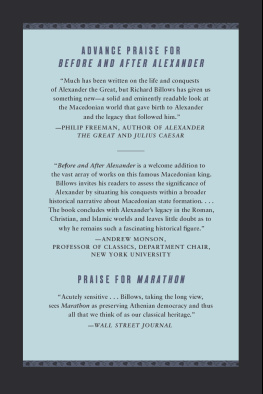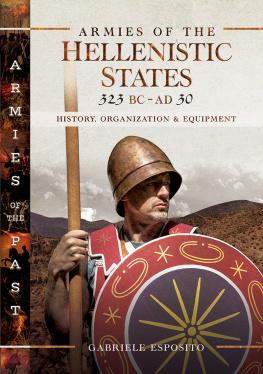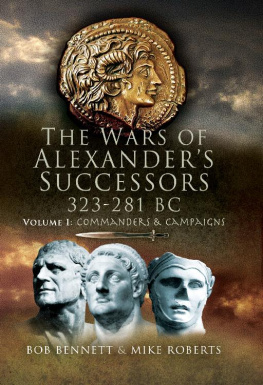Demetrius the Besieger

Great Clarendon Street, Oxford, OX2 6DP, United Kingdom
Oxford University Press is a department of the University of Oxford. It furthers the Universitys objective of excellence in research, scholarship, and education by publishing worldwide. Oxford is a registered trade mark of Oxford University Press in the UK and in certain other countries
Pat Wheatley and Charlotte Dunn 2020
The moral rights of the authors have been asserted
First Edition published in 2020
Impression: 1
All rights reserved. No part of this publication may be reproduced, stored in a retrieval system, or transmitted, in any form or by any means, without the prior permission in writing of Oxford University Press, or as expressly permitted by law, by licence or under terms agreed with the appropriate reprographics rights organization. Enquiries concerning reproduction outside the scope of the above should be sent to the Rights Department, Oxford University Press, at the address above
You must not circulate this work in any other form and you must impose this same condition on any acquirer
Published in the United States of America by Oxford University Press
198 Madison Avenue, New York, NY 10016, United States of America
British Library Cataloguing in Publication Data
Data available
Library of Congress Control Number: 2019957890
ISBN 9780198836049
ebook ISBN 9780192573049
Printed and bound by
CPI Group (UK) Ltd, Croydon, CR0 4YY
Links to third party websites are provided by Oxford in good faith and for information only. Oxford disclaims any responsibility for the materials contained in any third party website referenced in this work.
The line it is drawn, the curse it is cast
The slow one now will later be fast
As the present now will later be past
The order is rapidly fadin
And the first one now will later be last
For the times they are a-changin
Bob Dylan
I am Demetrius, son of Antigonus. He sounded, too, like a deity announcing himself at the opening of a play.
Mary Renault,
Funeral Games
Preface
This book has its genesis in two doctoral theses separated by almost two decades. In 1994 at the University of Western Australia I embarked on a task inspired by Professor Brian Bosworth, to begin a historical and historiographical investigation into the life of Demetrius Poliorcetes, The Besieger of Cities. He warned me at the time that the topic would exceed the parameters of a doctorate, and so it hasby at least threefold. Moreover, the path has been labyrinthine, worthy almost of a Tolkienian quest, and I realized by 2012 that I would need a Symmachos to fulfil this mission. It was my great good fortune then that Charlotte Dunn, an outstanding student in the Classics Department at the University of Otago, approached me to discuss topics for her doctorate. The alliance was forged: she would write her PhD on the later life of Demetrius, to complement my own thesis and articles on his early life, and we at last present this tome in fulfilment of that task commenced so long ago.
My obligations in this undertaking are colossal. First, I am grateful to my professors at UWA who trained me rigorously in the skills I would need to practise Ancient History: Brian Bosworth, John Melville Jones, David Kennedy, and Judith Maitland. Secondly, I thank my thesis examiners, Richard Billows, Hans Hauben, and Waldemar Heckel, and thirdly my fellow students Jeff Champion and Lara OSullivan, who have gone ahead already to make their marks with excellent monographs on individuals from the Diadoch milieu.
I am particularly indebted to my friends Tim Howe, Daniel Ogden, Liz Baynham, John Yardley, Frances Pownall, Ed Anson, Victor Alonso, Yossi Roisman, Sabine Mller, and Franca Landucci Gattinoni, who have supported and aided me in innumerable ways at every turn, and without whom I do not feel I could continue in this profession.
I must also offer humble thanks to my global network of colleagues and friends who have empowered and enlightened me, discussing endless abstruse matters, answering specialist queries, or simply encouraging me during my long quest for the truth about Demetrius: Andy Meadows, Thomas Rose, David Karunanithy, Tom Martin, Andy Erskine, Shane Wallace, Peter Green, Richard Stoneman, Pierre Briant, Matt Trundle, Bert van der Spek, Tim Duff, Duncan Campbell, Brian McGing, Beth Carney, Kyle Erickson, Marek Olbrycht, Oleg Gabelko, Philip Bosman, Emma Nicholson and the Antigonid Network, Sheila Ager, Philip de Souza, Salvo Vacante, Andrea Primo, Bill Dominik, Cathy Lorber, Tom Boiy, Matt Dillon, Yvette Hunt, Peter Liddel, Katherine Hall, Brian Sheridan, and Eoghan Moloney.
The work on Demetrius was greatly facilitated by an Australian Research Council Postdoctoral Fellowship in 20002, and I am extremely grateful to my university for granting me periods of research and study leave in 2014 and 2017, during which chapters 1215 of the book were written. Macedonian studies has a long pedigree at the University of Otago. The discipline has occupied a prominent place on the Arts curriculum for over sixty years. In the 1950s and 60s Jim Hamilton produced his seminal commentary on Plutarchs Life of Alexander, and from the 1970s to 90s Chris Ehrhardt, a student of the legendary Ernst Badian, taught and published on Macedonian studies here. Consequently, the library holdings in our field are second to none, and we consider ourselves privileged to have been able to access the collection and the wonderful expertise of the dedicated library staff at our institution while writing this book. I would also acknowledge the enthusiasm of my past and present graduate students, especially John Walsh, Andrew Collins, Bill Richardson, Cam McPhail, Alessandra Pugliese, Chelsea Johnston, Jon McColl, and Kara Braithwaite-Westoby, who have been part of the vibrant postgraduate culture at Otago, and have politely listened to my ruminations on Demetrius, and stimulated me with their fresh insights and energy. It is serendipitous that in 2019 the University of Otago celebrates its 150th anniversary, and it is a great pleasure to produce our book to coincide with this occasion.
I must also express my gratitude to the University of Exeter for an appointment as Honorary Associate Professor from 2016 to 2022, and for the excellent hospitality of Daniel Ogden and the Department of Classics and Ancient History during my visit in 2017. On this journey I was able to give seminars on Demetrius at Exeter, Trinity College, Dublin, and the Waterloo Institute for Hellenic Studies in Ontario; I thank the audiences for many insightful questions, comments, and correspondence, which have certainly enriched this book.
Finally, I would thank my brilliant family, Tess, Trevor, Dylan, and Jaimee, and my dearest friends Dougall and Jaz Love, Dennis Stevens, Rachel Rosetti, Paul Knight, Chelsea Johnston, Hudson Hill, Ken and Lisette Spall, who have always heard me, and believed in me. Last of all, I confess that I owe everything to Liz Hardy, my own Lamia, who is not only a sublime proofreader and indexer, but is the sweetest Hetaira of all.
Pat Wheatley, Dunedin, February 2019
The ancient world has been a long-time obsession of mine. The discovery of Mary Renaults Alexander trilogy sparked my interest in Alexander and his Successors in particular, and for a time I was happily entertained by historical novels. But as though a

